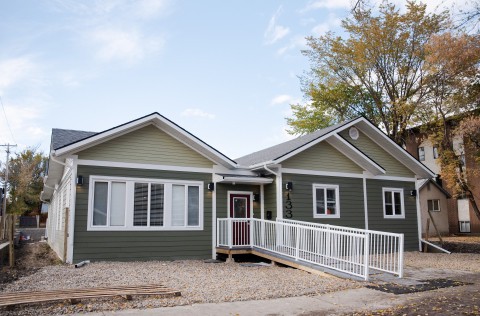
Sanctum 1.5, Sanctum Care Group’s hospice with respite and supportive care for people affected by HIV and AIDS.
In October 2018, Saskatoon will see the opening of Sanctum 1.5, the province’s first affordable care home for pregnant women living with HIV. Sanctum 1.5 promises to be transformative for health care in the province by offering access to positive pregnancy support.
According to the HIV Prevention and Control Report 2017 released by the Government of Saskatchewan, the rate of HIV diagnoses in the province is 15.1 per 100,000 individuals. Action Canada for Sexual Health & Rights notes that a quarter of the people living with HIV in Canada are women and the fastest growing group, in terms of HIV infections, are women of childbearing age.
Located in the Pleasant Hill neighbourhood, Sanctum 1.5 is a 10-unit housing project developed to provide compassionate, harm-reduction care to pregnant women who live with HIV and/or struggle with substance use. Sanctum’s approach is harm reduction, with continuous pre- and post-natal care and a focus on nurturing parental skills. The home also offers a communal kitchen, addiction services and counselling support.
Pregnant women face enough daily stress caring for themselves and their pregnancies, and women living with HIV face additional stress in terms of accessing de-stigmatized health care, affordable housing and counselling services. Furthermore, women of colour, Indigenous women and women who are economically vulnerable who are living with HIV must also navigate the racial and class discrimination that intersects with HIV-stigma in Saskatchewan.
Navigating the health-care system without support is an enormous burden to place upon pregnant women living with HIV. This compounded anxiety contributes significant stress to these women at a time when a healthy environment is critical for mothers and their children. Sanctum 1.5 recognizes these realities and provides an opportunity to increase positive outcomes for mothers by offering a supportive home before and after childbirth.
According to Action Canada, mothers living with HIV often report experiencing care focused primarily on their babies rather than themselves — contributing to feelings that the health-care system is dehumanizing. Instead, supportive health-care models need to be implemented emphasizing that mothers deserve and require care as well.
Discussions around HIV in Saskatchewan are heavily stigmatized, which inevitably contributes to women’s experiences during pregnancy. Dr. Arline Geronimus describes the chronic impact of racial discrimination on women’s bodies as “weathering.” Stress deteriorates the body and can lead to poor pregnancy outcomes, including infant mortality. One cannot overestimate the negative impact that discrimination and social stigma can have on the body, and the problem is only heightened when they intersect.
Every person has a right to make positive changes in their life and should be given equitable access to the resources needed to provide the best possible outcomes for their children. Every mother deserves to be supported and reminded that she is courageous for seeking care for herself and her baby in a system that is not always welcoming. The experience must change from one of shame to one of celebration.
Ultimately, it is the responsibility of the Saskatchewan government to address systemic barriers present in every aspect of life, so everyone’s health outcomes improve. In the future, Saskatchewan’s health-care system should focus on the experiences of its most vulnerable populations. Pregnancy and motherhood must be de-institutionalized, with more funding made available for community spaces focused on healing.
Health-care workers and the public must be properly educated on the realities of social discrimination and the stigma of living with HIV. When stigma and discrimination decrease, all women will have healthier environments to thrive in. Hopefully, Sanctum 1.5 will become a successful living example — one that will help community-based health programs with continued support across rural, remote and urban areas in all of Canada.
—
Raquel Alvarado
Photo: Riley Deacon / Photo Editor
Leave a Reply